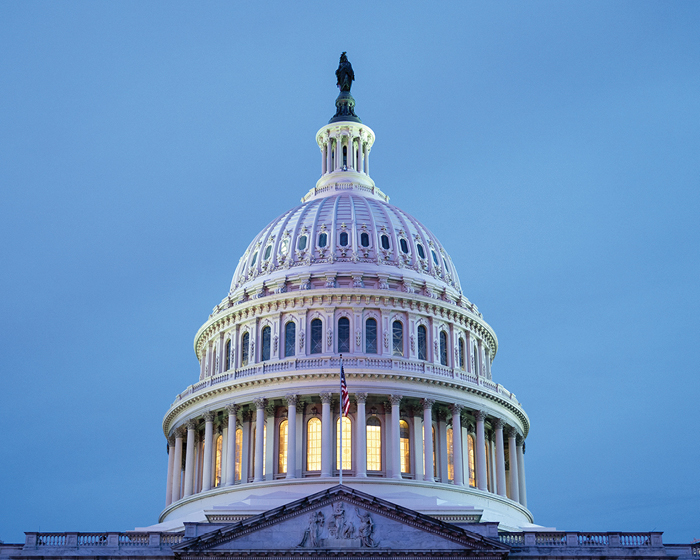Key Takeaways
- An R&D benefit in the OBBBA could trigger the corporate alternative minimum tax with some large taxpayers for the transition period.
- Some urging Treasury to adjust the CAMT income formula to provide relief on the issue.
- Shutdown will last past Nov. 1, adding to confusion about Affordable Care Act markets.
- Senate deals Trump rebuke on Canada tariffs.
- Congress mulling crypto tax legislation.
It was always clear that implementing the One Big Beautiful Bill Act would involve working around some thorny transition issues. In many cases, it’s as much about what Congress declined to do as what it did.
For instance, while the legislation repealed or reduced many of the green energy credits enacted by the 2022 Inflation Reduction Act, it left most of the rest of the bill in place. That includes the 15% corporate alternative minimum tax, which targets large companies with low effective tax rates, measured through financial accounting statements. While the CAMT is unpopular with taxpayers (and among many tax experts) Congress, wary of the $200 billion 10-year price tag, opted to leave it in place.
In many cases the new tax benefits from the OBBBA will not be affected by CAMT—bonus depreciation is protected from the tax, and the change to expensing for R&D actually moves income tax closer to the financial accounting formula. But the new Sec. 174 changes include a provision allowing companies to expense more quickly unamortized R&D costs from 2023-2024, and that can create some immediate dips in effective tax rates, triggering the minimum tax for 2025.
Many industry groups, such as the National Foreign Trade Council and the R&D Coalition, have pushed Treasury to include relief on the issue, arguing that it was not Congress’ intention to create a one-time tax hit with the legislation. The CAMT legislation gave Treasury broad powers to adjust the formula, including to “to prevent the omission or duplication of any item.”
“Policymakers should think through this unanticipated interaction between R&D expensing and CAMT, which could cut against congressional intent for accelerated R&D deductions in 2025,” wrote Andrew Lautz of the Bipartisan Policy Center.
But not everyone agrees.
Kyle Pomerleau, a senior fellow at the American Enterprise Institute, said that whether or not the CAMT hit was anticipated by Congress, it was an inevitable consequence of leaving the tax in place, which was a clear policy choice.
“Ultimately, Congress needs to step in and either adjust or repeal CAMT,” he wrote. “Treasury should not provide relief here.
In this case and many others, divining Congressional intent could be as hard as interpreting the tax code in the first place.
The Shutdown Stretches On
As October closes out, the government is set to remain shut down past November 1, when open enrollment begins for state healthcare exchanges for Obamacare—a deadline some hoped would resolve the impasse. With enhanced tax credits for the exchanges set to expire, consumers across the nation will now find out how much their premiums will hike for 2026 without the support provided by the enhancement.
With both parties locked into their positions, it’s possible that the deadlock could last well into November. With flights already affected by reduced air traffic controller staffing, the approaching Thanksgiving travel season could be what finally forces an agreement.
But if an extension of the healthcare tax credit enhancement is part of the solution, the longer Congress waits past Nov. 1, the more complicated the negotiations will become.
Recent Tax Pieces:
Senate Rebuffs Trump on Canada Tariffs Amid GOP Dissent on Trade – Alicia Diaz, Bloomberg Tax ($):
Four Republicans joined all Democrats to pass the legislation on a 50-46 vote.
The vote underscores unease with the tariffs as Americans head into the holiday shopping season. It’s the second time this week the GOP-held body has split from the president over tariffs, after seeking to limit levies on Brazil earlier this week.
Wyden Says He’s Hearing ‘Crickets’ From GOP on Healthcare Credit – Katie Lobosco, Tax Notes ($):
The tax credit, which lowers the cost of health insurance purchased through Affordable Care Act exchanges, is scheduled to expire after December 31. But insurance companies have already set prices for next year, and open enrollment begins November 1.
Some moderate Republicans have publicly thrown their support behind temporarily extending and reforming the enhanced premium tax credit, which could prevent some of the premium increases before the 2026 midterm elections. But other Republicans, who have long fought to dismantle the ACA, staunchly oppose continuing the subsidy.
How the IRS and ICE Tussled During Trump’s Deportation Push – Richard Rubin, The Wall Street Journal ($):
The tax agency moved from flat rejection of February’s broad requests to a much narrower August disclosure. The IRS found more than 47,000 matches of name-and-address information from a list of 1.3 million provided by ICE. Immigration authorities haven’t said whether or how they are using that information, but up-to-date tax records could help them more easily locate people who have stayed in the country despite deportation orders.
Crypto Chatter Speeds Up in Congress Amid Shutdown – Zach C. Cohen and Steven T. Dennis, Bloomberg Tax ($):
Lummis introduced legislation on this topic earlier this year that has the support of some GOP tax writers. Sen. Steve Daines (R-Mont.) and Rep. Max Miler (R-Ohio), both members of tax-writing committees, have been working on other potential tax frameworks.
Senators in both parties at a hearing this month expressed interest in a bipartisan tax bill for crypto. But rules for small transactions likely remain a key hurdle to accord.
Democratic Bill Would Undo Clean Energy Credit Cuts From OBBBA – Cady Stanton, Tax Notes ($):
Some of the OBBBA changes — particularly some enhancements to clean energy credits — would be maintained in the bill, such as tax incentives for fuel cells and longer-term incentives for low-carbon fuels, including fuel cell property as eligible for section 48E.
Make a habit of sustained success.



